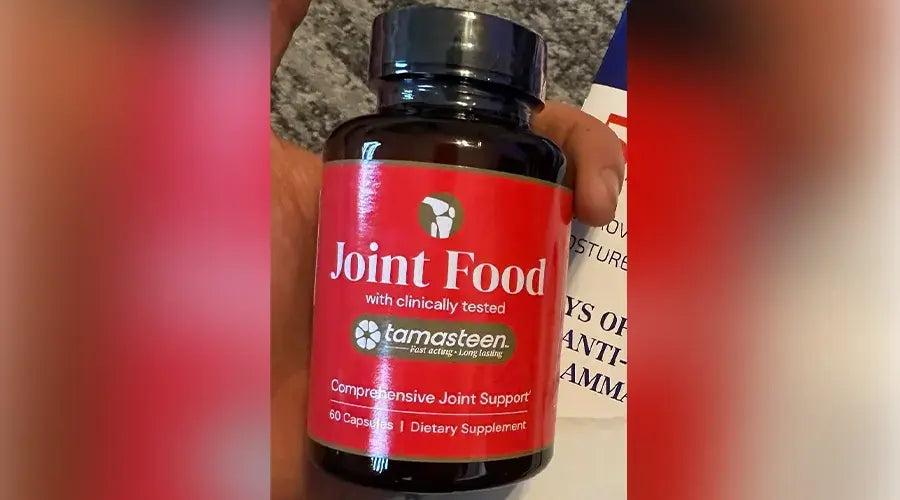Test de Joint Food : Ce produit est-il vraiment bénéfique pour la santé des articulations ?
Joint Food est un complément alimentaire pour les articulations qui associe 10 ingrédients, dont le curcuma, le MSM et l'extrait de graines de tamarin. Il vise à réduire l'inflammation, à soutenir le cartilage et à améliorer la souplesse.
Advertiser Disclosure: We independently select all the products. If you click through links we provide, we may earn a commission.

Points clés à retenir
- Joint Food associe le curcuma, le MSM et l'extrait de graines de tamarin pour favoriser la santé des articulations.
- Des recherches confirment l'efficacité du curcuma et du MSM pour réduire l'inflammation et soutenir le cartilage.
- Les expériences des utilisateurs varient ; certains font état d’une amélioration de la flexibilité et d’une réduction de la rigidité, tandis que d’autres constatent des changements minimes.
- Généralement sans danger, mais certains utilisateurs ont ressenti de légères nausées, probablement dues au curcuma.
- Pour un soutien articulaire plus complet, optez pour JointXL Plus, qui contient des ingrédients supplémentaires comme la glucosamine et la chondroïtine pour une meilleure santé articulaire.
Introduction
Imaginez-vous vous réveiller un matin et réaliser que le geste autrefois si simple de se baisser pour lacer ses chaussures est devenu un véritable calvaire. Les douleurs articulaires ne sont plus un désagrément passager, mais un combat quotidien qui vous prive des petits bonheurs du quotidien.
Que ce soit en faisant du jardinage, en jouant avec ses petits-enfants ou simplement en marchant sans grimacer, l'impact est bien réel.
La demande croissante de compléments alimentaires pour la santé articulaire témoigne de l'ampleur du problème. Les gens recherchent des solutions qui non seulement soulagent l'inconfort, mais qui contribuent également à la santé de leurs articulations à long terme. C'est le cas de Joint Food, un complément alimentaire qui prétend nourrir les articulations.
Grâce à un mélange de 10 ingrédients, dont le Tamasteen™ breveté, il promet de soulager les douleurs articulaires, d'améliorer la flexibilité et de réduire l'inflammation.
Mais est-ce vraiment le cas ? Voyons si Joint Food répond à toutes les attentes !
Analyse des ingrédients
Joint Food associe un mélange de 10 ingrédients, chacun sélectionné pour cibler des aspects spécifiques de la santé articulaire. Parmi ceux-ci figurent l'extrait de racine de curcuma à spectre complet, le méthylsulfonylméthane (MSM), la vitamine C naturelle, l'extrait de graines de tamarin, le mangoustan, le collagène de type II, le boswellia, l'acide hyaluronique, la bromélaïne et le cétyl myristoléate (CMO).
 Informations sur les compléments alimentaires pour les articulations
Informations sur les compléments alimentaires pour les articulations
Certains de ces ingrédients sont étayés par de solides preuves scientifiques. D'autres, en revanche, ne bénéficient que d'un soutien limité ou non concluant. Nous présentons ci-dessous les cinq ingrédients clés de Joint Food, en détaillant leurs avantages et leurs limites potentiels.
Extrait de racine de curcuma à spectre complet
Le curcuma, épice dorée utilisée depuis longtemps en médecine traditionnelle, doit ses bienfaits pour la santé à la curcumine , son composé actif. La curcumine est un puissant anti-inflammatoire et antioxydant dont le rôle dans la réduction des douleurs et de la raideur articulaires, notamment en cas d'arthrose, a fait l'objet de nombreuses études . Selon une étude de 2021 , elle agit en inhibant les voies inflammatoires de l'organisme, ce qui peut contribuer à soulager l'inconfort et à améliorer la mobilité.
Cependant, la biodisponibilité naturelle de la curcumine est faible, ce qui signifie que le corps a du mal à l'absorber et à l'utiliser efficacement.
Joint Food affirme utiliser un extrait de curcuma à spectre complet, qui pourrait contenir des curcuminoïdes et des composés supplémentaires pour en améliorer l'absorption. Cela pourrait le rendre plus efficace que les compléments alimentaires à base de curcuma classiques.
Les bienfaits du curcuma pour la santé articulaire sont largement étayés par la recherche [1] . Sa capacité à réduire l'inflammation et à améliorer la fonction articulaire en fait un ingrédient précieux pour les articulations. Nous approuvons cet ingrédient.
Méthylsulfonylméthane (MSM)
Le MSM est un composé soufré présent naturellement en petites quantités dans certains aliments. Il est largement utilisé pour soulager les douleurs et l'inflammation articulaires.
Des études montrent que le MSM peut améliorer les symptômes de l'arthrose, tels que la douleur, la raideur et la mobilité. Son action reposerait sur la réduction des marqueurs inflammatoires et un apport en soufre, un élément essentiel à la formation du cartilage et des tissus conjonctifs.
En plus de ses propriétés anti-inflammatoires, le MSM peut également favoriser la récupération des lésions musculaires induites par l'exercice, ce qui est idéal pour ceux qui sont toujours en mouvement [2] .
Le MSM est soutenu par des études cliniques démontrant son efficacité pour réduire les douleurs articulaires et améliorer la mobilité. Son double rôle dans la réduction de l'inflammation et le soutien du cartilage en fait un ingrédient clé de Joint Food. Nous approuvons cet ingrédient.
Selon le Dr Colin Edgerton , MD, FACP
Le curcuma et le MSM sont des ingrédients bien documentés, dont les bienfaits pour la santé articulaire sont avérés. Toutefois, il est essentiel de prendre en compte la biodisponibilité de composés comme la curcumine et de veiller à leur absorption optimale pour des résultats optimaux.
Vitamine C naturelle
La vitamine C est essentielle à la synthèse du collagène, une protéine indispensable au maintien d'un cartilage sain. Selon une étude de 2018 , elle agit également comme un puissant antioxydant, protégeant les articulations du stress oxydatif causé par les radicaux libres [3] .
Bien que ces fonctions soient importantes, la plupart des gens obtiennent déjà suffisamment de vitamine C par leur alimentation, et une supplémentation ne procure pas forcément de bénéfices supplémentaires, sauf en cas de carence.
De plus, les preuves liant directement la supplémentation en vitamine C à des améliorations significatives de la santé articulaire sont limitées.
Ainsi, bien que la vitamine C soit essentielle à la santé globale, son inclusion dans Joint Food n'apporte probablement pas de valeur ajoutée significative aux personnes qui suivent déjà une alimentation équilibrée. Nous désapprouvons cet ingrédient.
Extrait de graines de tamarin
L'extrait de graines de tamarin est un produit relativement récent dans le domaine de la santé articulaire. Il est censé procurer un soulagement durable en ciblant les voies inflammatoires et en favorisant la santé du cartilage.
Certaines études préliminaires suggèrent que l’extrait de graines de tamarin pourrait avoir des propriétés anti-inflammatoires et antioxydantes, mais la plupart de ces recherches sont soit limitées, soit menées sur des animaux [4] .
En l'absence d'essais cliniques humains rigoureux, il est difficile de valider les affirmations concernant l'efficacité de l'extrait de graines de tamarin pour la santé articulaire.
L'absence d'études cliniques rigoureuses et validées par des pairs rend difficile de justifier l'utilisation de l'extrait de graines de tamarin comme ingrédient fiable pour la santé articulaire. Par conséquent, nous n'approuvons pas cet ingrédient.
Mangoustan
Le mangoustan, un fruit tropical, est riche en xanthones, un groupe d'antioxydants censés combattre le stress oxydatif et l'inflammation [5] .
Bien que ces propriétés soient prometteuses, les preuves sont insuffisantes pour confirmer leur efficacité sur l'amélioration de la santé articulaire. La plupart des études portent sur les bienfaits généraux des antioxydants plutôt que sur des effets spécifiques sur les articulations.
De plus, la biodisponibilité des xanthones dans le mangoustan est mal comprise, ce qui soulève des questions quant à l'efficacité avec laquelle l'organisme peut utiliser ce composé.
Les recherches sur le rôle du mangoustan dans la santé articulaire sont rares et peu concluantes, ce qui rend son inclusion dans Joint Food moins pertinente. Par conséquent, nous n'approuvons pas cet ingrédient.
Nous avons essayé Joint Food
 Nourriture pour les articulations
Nourriture pour les articulations
Dès que j'ai essayé Joint Food, j'ai été frappé par sa praticité. Les gélules sont faciles à avaler et la dose recommandée s'intègre parfaitement à une routine quotidienne.
Cependant, ce produit ne nécessite aucune mise en mélange et n'a pas de goût, puisqu'il se présente sous forme de capsule, ce qui est un avantage pour ceux qui n'aiment pas les poudres.
Après une utilisation régulière pendant plusieurs semaines, on a constaté de légères améliorations de la flexibilité articulaire et une réduction de la raideur. Le produit prétend agir sur l'inflammation et soutenir le cartilage, et bien qu'aucun changement spectaculaire n'ait été observé, les effets étaient perceptibles au fil du temps.
Il convient toutefois de noter que les résultats peuvent varier en fonction des conditions individuelles et de la régularité d'utilisation.
Joint Food est donc un complément alimentaire correct pour ceux qui souhaitent préserver la santé de leurs articulations. Cependant, compte tenu de ses résultats subtils et de l'absence de bénéfices immédiats et visibles, nous ne le recommandons pas comme solution de choix.
Si vous recherchez d'autres solutions pour améliorer la vitalité masculine, consultez notre avis sur Primal Force Mobilify . Vous y trouverez une comparaison claire des ingrédients, des bienfaits et des témoignages d'utilisateurs pour vous aider à faire le bon choix pour une meilleure santé de la prostate.
Effets secondaires et sécurité
Joint Food semble être généralement bien toléré par la plupart des utilisateurs, avec très peu d'effets secondaires signalés. D'après les témoignages, certaines personnes ont ressenti de légères nausées, probablement dues à l'extrait de curcuma.
Il s'agit d'une réaction courante au curcuma à fortes doses ou lorsqu'il est consommé à jeun. Aucun effet indésirable grave n'a été relevé dans les études.
Ce produit ne contient ni caféine ni stimulants, ce qui le rend adapté aux personnes sensibles à ces ingrédients.
Toutefois, les personnes souffrant d'allergies spécifiques, comme aux crustacés, doivent examiner attentivement la liste des ingrédients, car certains compléments articulaires peuvent contenir des composants dérivés des crustacés.
Bien que Joint Food soit présenté comme sûr pour un usage quotidien, sa formule exclusive a été critiquée pour un sous-dosage de certains ingrédients clés. Cela soulève des questions quant à son efficacité globale plutôt qu'à son innocuité.
Comme toujours, consultez un professionnel de la santé avant de vous lancer, surtout si vous avez des problèmes de santé préexistants ou si vous prenez des médicaments.
Avis clients authentiques
Joint Food obtient une note de 3,9 étoiles sur 5, basée sur plus de 700 avis sur Amazon. Les avis sont partagés : certains utilisateurs font état d'un soulagement au niveau des épaules et des genoux après avoir intégré ce complément alimentaire à leur routine, tandis que d'autres ne constatent aucun soulagement et le trouvent cher.
Un client satisfait qui a laissé une note de 5 étoiles a partagé son avis.
Étant une randonneuse assidue, j'ai testé plusieurs marques. J'ai été très surprise de constater que ce produit a soulagé mes douleurs articulaires et que l'inflammation a disparu. Facile à avaler et bon goût. Je n'utiliserai plus que cette marque désormais !
Cependant, toutes les expériences n'ont pas été positives. Un utilisateur ayant attribué une note d'une étoile a signalé :
J'ai donné ce produit à ma mère, et elle a immédiatement réagi (nausées, violents maux de tête et un malaise général). J'ai cru devoir appeler une ambulance. Peut-être vaut-il mieux essayer une demi-gélule pour voir votre réaction. Les avis sont mitigés, et j'espérais un résultat positif. J'ai finalement opté pour le complément alimentaire Glucosamine, Chondroïtine MSM + Acide hyaluronique de Doctor's Best, et il semble lui convenir, sans aucun effet secondaire.
Où trouver les meilleures offres
Joint Food est disponible sur son site officiel et sur les principales plateformes de vente en ligne comme Amazon. Sur le site officiel, une bouteille coûte 69,95 $, avec des réductions pour les lots de plusieurs bouteilles.
Sur Amazon, le prix d'une seule bouteille est de 69,89 $. Comparé à d'autres compléments articulaires , Joint Food se situe dans la catégorie des produits haut de gamme.
Certaines alternatives, comme les gommes Qunol au curcuma et à la curcumine , peuvent coûter moins cher tout en offrant un mélange complet d'ingrédients similaire à celui des produits Joint Food. N'oubliez pas de tenir compte de la qualité des ingrédients et des avis des clients pour évaluer le rapport qualité-prix.
Avantages et inconvénients
Avantages :
- Contient 10 ingrédients testés cliniquement pour la santé des articulations, dont Tamasteen™.
- Soutient le cartilage, le liquide synovial et soulage l'inflammation.
- Offre une nutrition et une flexibilité articulaires à long terme
- Composé d'ingrédients naturels comme le curcuma, l'extrait de graines de tamarin et le mangoustan
- Des réductions pour l'achat de plusieurs bouteilles sont disponibles sur le site officiel.
Cons
- Prix premium par rapport à certaines alternatives
- Les résultats peuvent varier en fonction des conditions individuelles
- Nécessite une utilisation quotidienne régulière pour des résultats optimaux
- Disponibilité limitée en magasin
- Peut ne pas convenir à tous les régimes alimentaires ou restrictions alimentaires.
- Mélange exclusif masquant les ingrédients sous-dosés
Faut-il acheter des aliments à partager ?
Pour répondre à cette question, considérons d'abord quelques points ;
Certains utilisateurs de Joint Food constatent une nette amélioration de la souplesse articulaire et une réduction de la raideur après une utilisation régulière. D'autres, en revanche, ne remarquent que peu ou pas de changement, et quelques-uns expriment leur déception quant au dosage insuffisant des ingrédients.
Il ne faut pas non plus négliger le fait que certains utilisateurs ont signalé de légères nausées, probablement dues à l'extrait de curcuma.
Parmi ses atouts, Joint Food contient des ingrédients bien étudiés, comme l'extrait de racine de curcuma à spectre complet et le méthylsulfonylméthane (MSM). Reconnus pour leurs propriétés anti-inflammatoires et leur capacité à préserver la santé du cartilage, ces ingrédients font de Joint Food l'un des meilleurs compléments articulaires disponibles.
Toutefois, l'inclusion d'ingrédients moins bien documentés comme l'extrait de graines de tamarin et le mangoustan soulève des questions. Bien qu'ils présentent un certain potentiel, le manque de preuves cliniques solides et les faibles dosages de la formule exclusive pourraient en limiter l'efficacité.
Pour une solution plus complète, envisagez d'associer les bienfaits des ingrédients approuvés de Joint Food à ceux de JointXL Plus . Ce complément alimentaire est conçu pour compléter ces composants grâce à des dosages cliniquement validés et des ingrédients supplémentaires, pour un soutien articulaire optimal.
En fin de compte, tout dépend de vos besoins et de vos attentes. Évaluez ce qui vous convient le mieux et consultez un professionnel de la santé si nécessaire.
FAQ
References
Flawless Bloom has strict sourcing policies and relies on primary sources such as medical organizations, academic institutions, governmental agencies, and peer-reviewed scientific journals. Read more about how we ensure our content is accurate, thorough, and unbiased by reading our editorial process.
- Effets thérapeutiques du curcuma ou de l'extrait de curcumine sur la douleur et la fonction chez les personnes souffrant d'arthrose du genou : une revue systématique : https://doi.org/10.1136/bmjsem-2020-000935
- Efficacité du méthylsulfonylméthane (MSM) dans la douleur liée à l'arthrose du genou : un essai clinique pilote : https://doi.org/10.1016/j.joca.2005.10.003
- Efficacité de la supplémentation en vitamine C sur la synthèse du collagène et le stress oxydatif après des lésions musculo-squelettiques : une revue systématique : https://doi.org/10.1177/2325967118804544
- L’extrait de graines de tamarin (Tamarindus indica) améliore l’arthrite induite par les adjuvants en régulant les médiateurs de la dégénérescence du cartilage et des os, de l’inflammation et du stress oxydatif : https://doi.org/10.1038/srep11117
- La mangostanine, une xanthone extraite du fruit du Garcinia mangostana, exerce des effets protecteurs et réparateurs sur les dommages oxydatifs des kératinocytes humains : https://doi.org/10.3390/ph15010084





























